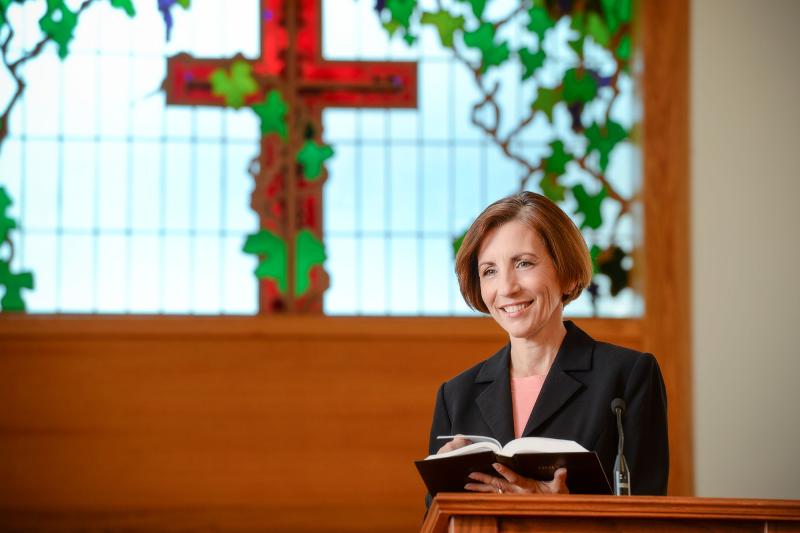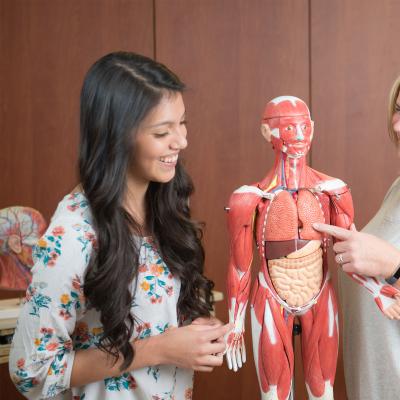- AdventHealth University

Updated On: January 29, 2026
About 70% of U.S. adults describe themselves as spiritual in some way, and an overall majority of U.S. adults say they believe people have a soul or a spirit — according to the latest research by Pew. When these individuals are suffering physically, emotionally or spiritually, they may turn to a chaplain, a professionally clergy trained to offer faith-based guidance to others in times of stress or uncertainty.
If you are a passionate, caring person interested in helping others spiritually, you may be wondering how to become a chaplain and what the role of a chaplain is in health care. You would want to continue your journey with a Master of Science in Spiritual Care.
You might also have other questions, such as "What does a chaplain do? or "What is an average chaplain salary?" In this article, we will answer those questions and help you decide whether becoming a chaplain is the right path for you.
What Is a Chaplain?
A chaplain is a certified clergy member who provides spiritual care to individuals in a non-religious organization, as opposed to a church congregation. The role of a chaplain in a government agency might differ slightly from the role of a chaplain in a health care setting.
But what does a chaplain do besides offer spiritual guidance? Because chaplains are ordained ministers, they can officiate ceremonies such as weddings and funerals, lead baptism services or provide final rites for patients who are passing away.
The role of a chaplain does not exclude helping people who do not consider themselves religious. Chaplains can serve as spiritual leaders for patients who do not belong to a specific religious community but who, like most Americans, believe in a soul or spirit.
Many students also wonder, “What is a chaplain’s role in a non-religious setting?” Because they often work in secular settings, chaplains can lead nondenominational religious services that benefit patients and staff from a variety of religious and spiritual backgrounds.
What Does a Chaplain Do?
The role of a chaplain may vary depending on the environment in which they work. For example, many chaplains work in hospitals, hospice agencies or military units.
So, what does a chaplain do in these settings? Let’s take a look.
What Does a Hospital Chaplain Do?
The primary role of a hospital chaplain is to offer spiritual support when a patient’s typical faith community is unavailable. For example, if a patient’s hospitalization keeps them from attending religious services, a hospital chaplain can provide support.
A hospital chaplain can also serve patients who don’t have a spiritual leader or pastor. You can learn more about the duties and responsibilities of a hospital chaplain here.
What Does a Hospice Chaplain Do?
Hospice chaplains can serve as specialized ministers at bedsides of patients with religious concerns. Patients who are terminally or critically ill can have spiritual conversations with chaplains.
The role of a hospice chaplain can be very similar to that of a social worker, in that they advocate for patients and their treatment options. Hospice chaplains also care for patients’ families, offering needed guidance and spiritual comfort. As professionals who work with patients, hospice chaplains plan and document their care and maintain professional records.
What Does a Military Chaplain Do?
A military chaplain provides counseling and spiritual support to military members facing personal or professional challenges. The role of a military chaplain entails serving as a confidant for a variety of service members and exhibiting an understanding of the unique military lifestyle.
Because of the spiritual diversity present in the military, a chaplain's role is to coordinate nondenominational services for military units, providing spiritual guidance across a range of belief systems.
How to Become a Chaplain
Step 1: Earn a Degree
Because chaplains play important spiritual roles across multiple settings, they need a theological education. They begin by earning a bachelor’s degree in biblical studies or religious studies. Courses focus on church history, biblical worldviews and critical thinking.
Many organizations require chaplains to have an advanced degree, such as a Master of Science in Spiritual Care, a master’s degree in divinity, or a similar degree. Graduate degrees prepare prospective chaplains for pastoral care across a variety of settings and can lead to higher average chaplain salaries.
Step 2: Complete Training and Earn Certification
There are a variety of certifications available to chaplains. The proper chaplain certification depends on the individual's role. Some chaplains in health care choose a 12-week Clinical Pastoral Education (CPE) program through the Association for Clinical Pastoral Education. Other training programs are offered through accredited organizations across the country.
Additional certifications may be needed depending on where a chaplain works. For example, military, hospital, and hospice chaplains can be certified through the National Association of Catholic Chaplains, the Board of Chaplaincy Certification, or other professional organizations.
Step 3: Gain Experience
After earning a degree and receiving the necessary training and certification, chaplains who choose to work with patients can begin a health care residency. Many facilities recommend that chaplains complete a 2-year residency under the supervision of a senior chaplain. Gaining experience can further help to increase your salary.
While completing a residency, chaplains can gain additional experience by working at different religious organizations as clergy members, assistant pastors, and ministers. You can develop essential skills that will prepare you to take on leadership roles as a chaplain or pastoral counselor.
Chaplain Salary and Job Outlook
Working in a spiritual care occupation can yield a variety of benefits. An average clergy or chaplain salary is about $59,000, according to the most recent data from the U.S. Bureau of Labor Statistics (BLS).
An individual chaplain's role and workplace can affect salary levels. For example, chaplains who work in medical and surgical hospitals earn an average annual salary of $61,810, while those who are employed in home federal, state, and local government earn approximately $89,470. States with the highest employment of professionals in this occupation include New York, California, Oregon, Texas and Florida.
Earn a Master of Science in Spiritual Care
Working as a clinically trained minister enables a chaplain to provide spiritual guidance and care to diverse groups of people. Health care, hospice, and military chaplains guide and comfort patients from all religious backgrounds and belief systems, offering their expertise in settings where meaningful faith support is sorely needed and appreciated.
If you are interested in learning more about how to become a chaplain, explore how AdventHealth University’s Online Master of Science in Spiritual Care can prepare you for a rewarding career in the field in less than three years. In our program, you will learn how to:
- Demonstrate cultural sensitivity in a wide range of health care and spiritual environments
- Apply practical knowledge of different religions and approaches to spirituality throughout your career
- Provide spiritual assistance to patients across the lifespan, from newborns to the elderly
Take the First Step
Now that you know the steps needed to become a chaplain, you’re ready to start your spiritual and health care journey. Earn your Master of Science in Spiritual Care from AdventHealth University and prepare for rewarding careers helping individuals with a broad range of religious and spiritual needs.


